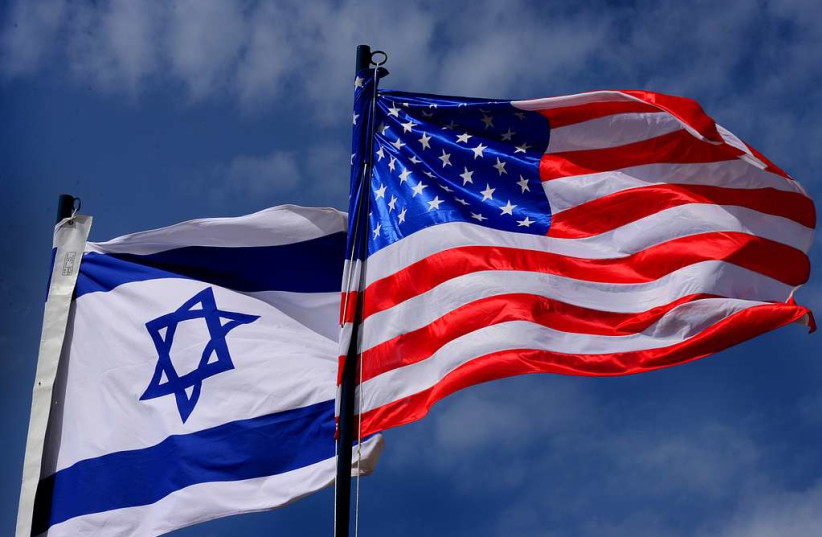President Joe Biden is within arm’s reach of fulfilling his 2021 public pledge to help Israel join the United States Visa Waiver Program, an achievement American friends of the Jewish state are poised to celebrate. The US-Israeli Memorandum of Understanding signed this month in Washington – on the sidelines of President Isaac Herzog’s visit – made clear the intentions and expectations of both governments.
The reasons to take this step could not be clearer: Expanding people-to-people contact will advance both national and communal interests, and the ability to travel should not be held hostage to political disagreements.
Opponents of Israel’s admission to the VWP before the end of the current fiscal year – a decision that would align policy toward America’s most trusted partner in the Middle East with the treatment accorded 40 other countries – argue that such a move would be an undeserved gift to the government of Prime Minister Benjamin Netanyahu.
The real beneficiaries of the program are average citizens
But it isn’t the prime minister, or any other Israeli government official, who will directly benefit from VWP inclusion, an administrative procedure that allows most Europeans – along with Japanese, Korean, Australian, and other like-minded nations’ citizens – simplified, automated approval for 90-day tourist and business travel to the US.
The beneficiaries will be individual Israelis: the teacher whose grandmother in Miami is suddenly hospitalized; the tech entrepreneur invited to pitch a new application at a venture capital retreat in the South Bay; the young doctor eager to check out fellowships at Chicago hospitals; the Israeli Arab and Jewish teenagers accepted to a peace-building summer camp in Maine.

Until now, each of these potential visitors to the US had to run an expensive, time-consuming, and often frustrating gauntlet, to apply for a visa. There’s a stiff application fee – now starting at $185 for most visas. An appointment for a personal interview in Tel Aviv or Jerusalem has to be requested – often with wait times of three months or over. And when appearing for an interview, an applicant must disprove the US consular assumption that he or she intends to violate the visa’s terms and overstay in America.
For years, skepticism about Israeli applicants’ intentions kept the so-called “refusal rate” high – beyond the 3% threshold for Visa Waiver Program eligibility. A public education campaign rolled out by the US Embassy, combined with Israeli government and civil society efforts, drove the rate down, clearing the 3% bar this year and leaving only one outstanding condition unmet: Israel had to demonstrate equal treatment of all American passport holders crossing its border, including Palestinian-Americans.
After intensive negotiations between US and Israeli authorities, leading to the just-signed MOU, that final condition is now being tested with new entry procedures at Ben-Gurion Airport. If Israel passes this one-month test, having attained the necessary low visa-refusal rate and agreeing earlier to share travelers’ security data with the US, no further legal or procedural obstacles should stand in the way of VWP admission.
Regrettably, and unacceptably, political obstacles may remain.
Critics of the current Israeli government – along with critics of the Jewish state’s very existence – are pressing the Biden administration to close the door to Israel’s VWP entry, or at least to keep that door closed until Israel can demonstrate it allows unimpeded travel for all US passport holders within the West Bank – and between the Palestinian Authority (PA)-run West Bank and Israel – over a longer period.
In close cooperation with outgoing US Ambassador Thomas R. Nides, Israel has been establishing procedures to maintain that standard, reconciling ongoing security challenges.
In a period of heightened tension and periodic violence in the West Bank – with a weakened PA abandoning its responsibilities across swaths of the territory – it must be noted that relaxing travel restrictions would appear counterintuitive, or simply reflect a refusal to accept the realities Israelis, their Palestinian neighbors, and visitors to the West Bank now face.
Keeping Israel out of the VWP won’t change those realities. Political leadership on both sides of this bitter conflict, partnership in combatting terrorism, disempowerment of extremists, and economic development that creates stakeholders in stability – these are the ingredients to build a new reality for all who live between the river and the sea.
True friends of Israel yearn for and wholeheartedly support progress on that long and frustrating process. In the meantime, clearing the path for citizens of America’s uniquely capable and reliable – and also uniquely threatened – democratic ally to travel to the US, for business or pleasure, is in the best interest of both countries.
While advancing the cause of equal treatment for all US passport holders, it will also lift a burden some of America’s best friends have borne for too long, bolster family bonds, strengthen understanding between peoples, expand economic opportunities, and encourage new educational, technological, cultural, interreligious, and civil society partnerships.
Thirty-five years after the first United States allies, the United Kingdom and Japan, were admitted to the Visa Waiver Program, it is time for Washington to add another worthy applicant, the State of Israel.
The writer is chief policy and political affairs officer of the American Jewish Committee.
